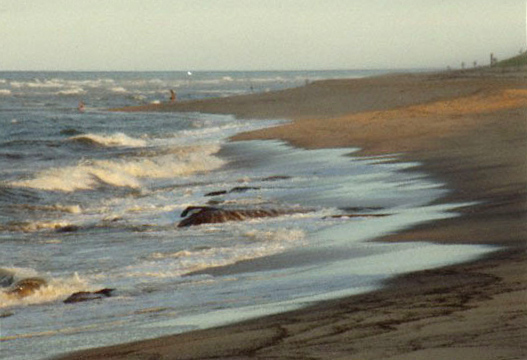“That was awesome!” shouted my spirited 7 year-old son as we walked into our cottage after a game of chess played on the beach on the tidal flats of Cape Cod Bay. Complete with over-sized pieces a la Harry Potter and the Sorcerer’s Stone. It was one of those unplanned adventures that turned out to be the day’s highlight, perhaps the summer’s. His unchecked enthusiasm touched me. Or was it simply a reminder of this week’s Summer Book Review, The Happiness Project by Gretchen Rubin? (2009 Harper Collins Publishers)
 Cape Cod National Seashore, The Outer Cape
Cape Cod National Seashore, The Outer Cape
I realize in referencing our cottage that I haven’t told readers about my most visible transition triumph, my summer residence. In late June I decamped with our two children from our humble abode outside of Boston, MA and took up residence on a dune on the Outer Cape. What can I say…transition has challenged me to think differently about my life, my career and the impact that I want to have. Oddly enough it was at this cottage that I realized that my daughter was struggling and in acute need of attention. Yes, it took a vacation and 7 days of consistent observation for me to notice what had been an on-going problem for more than a year. Extreme job anyone?
Gretchen Rubin penned an interesting transition story without ever using the “T” word. Prior to writing the book she had been an aspiring lawyer, a Yale Law School graduate, turned writer who queried herself about “what do I want from life anyway? Can this be me?” (Happiness, pg 1-2)
What resulted from her inquiry was a one year ‘Happiness Project’ complete with self-reflection on the meaning of happiness and a monthly Resolution Chart that was like Bill Murray’s Ground Hog Day for New Year’s Resolutions. The book wasn’t a page turner. Rubin spends a fair amount of time ‘sharing’ her monthly happiness trials which are mini behavioral exercises meant to achieve one of her overall happiness resolutions. She makes a case for the difference between a goal and a resultion….it seems goals can be completed whereas resolutions are on-going. In the end I walked away with several meaningful ideas and questions from her year-long project…several are particularly valuable for thinking about transition.
- The importance of social bonds. Rubin is most eloquent in her discussion of social bonds as a critical element of happiness. (Happiness, pg 141, 9+) Introvert or extrovert I hope you take a moment to think this one through. I experienced this in the negative, intense isolation or lack of social bonds. During my last two jobs, one as a ceo of a high-tech start-up and the other as an executive at an S&P 500 company, I had too erratic a travel schedule to ever find a moment or two with a friend. Overtime social bonds declined. So too happiness?
- People only see my actions. The author cites a piece by 20th century French poet Pierre Reverdy, “there is no love; there are only proofs of love. Whatever love I might feel in my heart, others will only see my actions.” (Happiness, pg 55) This one hit me on a day when I was acting badly and my daughter asked me what was the matter. I said something like, ‘Daddy really upset me,’ which was probably true but she was only seeing my bad behavior.
- You get to decide how you show up. Rubin is nothing if not well researched. Our friend Rosabeth Moss Kanter could learn a thing or two about citations here. But, I digress. In defining happiness Rubin wonders if happiness is possible or if some people are born to be unhappy. In response she offers some research I loved….”genetics account for 50%; life circumstances, such as gender, income, health, account for about 10-20%; and the remainder is a product of how a person thinks and acts.” (Happiness, pg 6) Rubin concludes that happiness really is in our court. What do you think?
Rubin offers a host of other intriguing issues related to happiness: indulgences, ambition, the fallacy of ‘arrival’ and the role of money. So how do I make the connection with transition?
Simple. If asked I would characterize my transition at a high level by losses; losses of connections, of identity, of jobs, of things I enjoyed doing or thought I did. When I finished Happiness I wished I’d found it earlier. I think I’d have marked fewer losses early on in my process.
When reading Happiness there is an undercurrent of Rubin needing to allow herself to be happy. To erase the expectations of her as a mother, writer, former lawyer, friend, daughter, wife…need I say more? She weaves throughout that it is hard to ‘be Gretchen’ not someone’s expectations of Gretchen. Sound familiar?
So how did I end up on a dune on the Outer Cape? Early in my transition I sat back and realized that in the not too distant future my kids would be over-committed to sports or uninterested in playing chess with over-sized pieces in the sand. I used that as a beacon to craft my professional self with flexibility so that I could work remotely. Upon hearing this plan a friend said, ‘once you do that you’ll spend your whole existence trying to figure out how to do that every year.’
Did she know it would make me happy? Would you be surprised if I felt guilty sometimes prioritizing this existence over my extreme former self? Go figure.
(c) 2012 NovoFemina.com – All rights reserved. No content on this site may be reused in any fashion without written permission from NovoFemina.com.
Right on Miss Linda! Enjoy the summer and keep on writing……………thank you! 🙂
Thanks for your kind words….LisaMarimekkoCambridge!
[…] Kudos & Events ← Summer Book Review #20: The Happiness Project […]